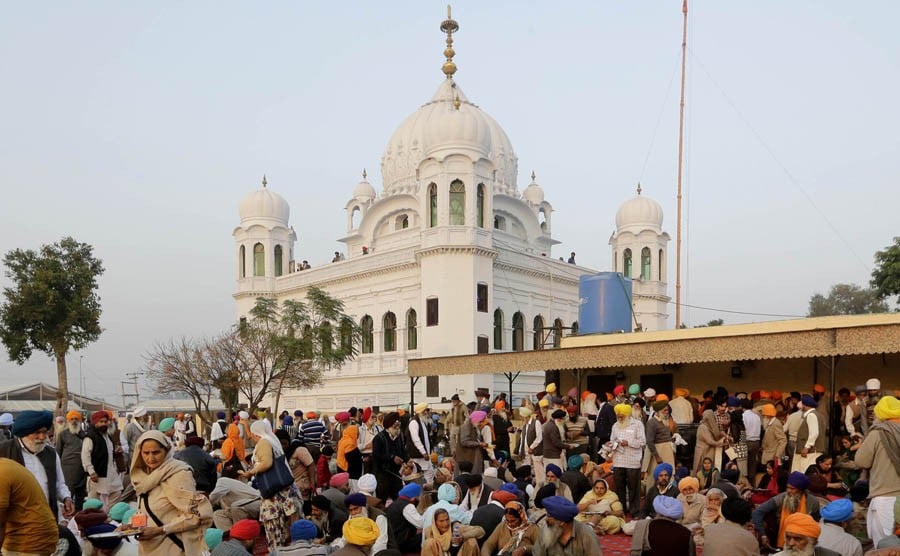
The government urgently needs to address the concerns of peace activists who fear that this excellent initiative might become a tool for the security elite in both countries

It started with a whispered conversation in August last year between General Qamar Javed Bajwa, Pakistan’s chief of army staff, and Navjot Singh Siddhu, the Indian cricket star turned politician. Just before the oath-taking ceremony of Imran Khan, then prime minister-elect, Gen Bajwa made an offer to Siddhu Bhaaji -- as he is endearingly called-- that made the latter’s day.
Beaming with excitement and displaying an ear-to-ear smile, Siddhu told his country’s media upon his return to Delhi Pakistan was ready to open visa-free entry for Sikh pilgrims from India to Gurdwara Darbar Sahib in Kartarpur located on the right bank of River Ravi. Kartarpur is important to Sikhs for being the site where Guru Nanak -- the first Guru -- established his first Sikh commune and founded the Gurdwara in the early 16th century.
The announcement delighted the Sikhs -- seen sometimes as somewhat softer underbelly of our colossal neighbour. It also appeared to have a bombshell effect on India’s war establishment.
Peace mongers in both countries celebrated it as a breakthrough. Pakistan and India have a forty-five years-old agreement for facilitating religious tourism. It has been frequently violated. Both states have been guilty of refusing to allow each other’s people to visit places of religious and spiritual significance. Pakistani zaireen (pilgrims) have been stopped from visiting Ajmer Sharif and other places covered by the Protocol on Visits to Religious Shrines 1974.
The Protocol covers 5 sites (of significance to Muslims) in India and 15 sites in Pakistan. Out of these fifteen sites, twelve are of significance to Sikhs, two for Hindus and one for Muslims. Although, Clause 1 of the Protocol provides for periodic expansion of the list of shrines to be covered under it, neither country has made any effort for many years to add more sites to it.
In practice, the list has shrunk considerably in the sense that both governments, especially the Indian government, have been rejecting visas for pilgrims to these agreed sites. The announcement to add Kartarpur Gurdwara to it, thus, was a genuinely pleasant surprise and gave a valid reason to peace activists to celebrate.
Given this backdrop it is a bit surprising to see the initiative survive the latest surge in xenophobic rhetoric and subsequent government actions on this side of the border that came in response to government actions on the other side of the border. In fact, Kartarpur is the only confidence building measure that is still continuing despite the impression that neither government is a big fan of confidence building at the moment.
While this still-in-the- pipeline measure has got the attention of our prime minister who has assured the Sikh community of its continuation, trade links and people-to-people contact via rail links (Samjhota Express for Wagha-Atari rail link and Thar Express for Munabao-Khokhrapar rail link) have been abruptly discontinued. The railways minister was heard saying during a presser that these links won’t resume while Pakistan Railways was under his command.
Why only Kartarpur? If Kartarpur corridor has been offered to facilitate our neighbours, why not expand the initiative to include other communities as well?
The 1974 Pact could benefit Hindus, Buddhists, Christians and Muslims in India, besides the Sikh community. Instead, we have severed the trade and rail links with the people of India and hurt the interests of our own people by downgrading the Indian diplomatic mission in Pakistan. The curtailed consular presence and lack of rail links means stopping our own people from visiting divided families across the border.
Meanwhile, the Afghan-India transit trade route through Wagha border remains unaffected. Have our decision makers thought about what message this would send to the millions of Pakistanis having families in India, and to the world? Instead of breaking all existing people-to-people links with India while insisting on Kartarpur, and be taken as selfish manipulators, why not show the world we mean business and that our business is genuine peace?
It can be argued that Kartarpur can benefit Pakistan in terms of national security because the corridor takes our security presence significantly closer to the Indian border. But an in-depth analysis is needed for ascertaining the real costs. So far, no environmental impact assessment has been commissioned by Pakistan government for the corridor, neither is one planned.
Now will it affect the farmers in and around the area? Hundreds of small farmers launched a protest earlier this year accusing the government of evicting them from their lands without offering commensurate compensation for their lands. After a meeting of Pakistani and Indian officials held on the Indian side to discuss details of next steps for building the corridor, some reports suggested that Pakistan had asked for a $20 fee per pilgrim and has refused Indian consular presence at the Gurdawara or accompanying pilgrims. Hyped out of context, this won’t show Pakistan in a very good light.
The government urgently needs to address the concerns of peace activists who fear that this excellent initiative might become a tool for the security elite in both countries.
There is no established link between religious tourism and a positive change in confrontational policies. But this kind of people-to-people contact certainly promotes greater understanding among nations. More frequent people-to-people contact makes people see one another as normal people, not some crazy zombies out to kill and decimate them.